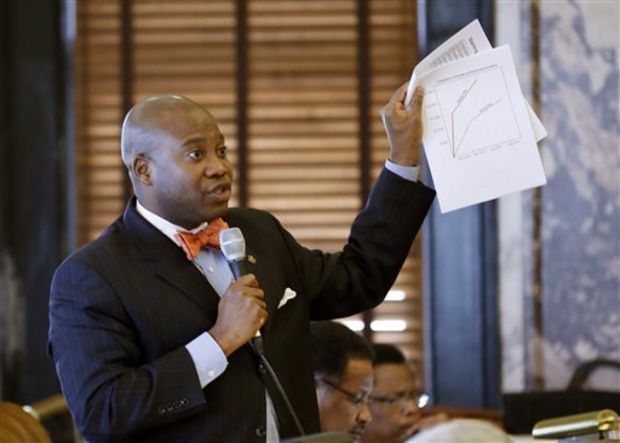
JACKSON – (AP) Some Mississippi senators want to cut the number of school districts in Bolivar County from the current six to either two or three.
Senate Bill 2760 would require the state Board of Education to combine the districts by 2014. The bill is moving to the full Senate after the body's Education Committee approved it Tuesday.
The county's six current districts are: Cleveland, Benoit, Mound Bayou, North Bolivar, Shaw and West Bolivar.
Senate Education Chairman Gray Tollison, an Oxford Republican, says mergers would cut administrative costs.
Another bill that's moving forward would allow the state Board of Education to consolidate or force new elections in failing districts that it takes into conservatorship for a second time.
The Senate earlier passed legislation to force Sunflower County's three districts to merge into one.
Miss. lawmakers meet 1st big deadline of session
In other legislative news, Mississippi lawmakers scrambled Tuesday to meet their first major deadline of the 2012 session, thinning out the list of bills and constitutional amendments they'll consider during the next two months.
Among the proposals that died are constitutional amendments that would've limited the governor's pardon power, defined life as beginning at fertilization and given legal rights to fetuses.
Also dead is a satirical bill to rename Mississippi's portion of the Gulf of Mexico as the “Gulf of America.'' Its sponsor, Democratic Rep. Steve Holland of Plantersville, said he filed it to spoof immigration-enforcement proposals, although the humor was lost on people who called him a bigot.
“It's deader than a corpse I'm burying in my funeral home,'' Holland, who's a funeral director, said Tuesday.
Several major proposals are still living, including bills to create charter schools and to allow local law enforcement officers to check people's immigration status.
A proposal to increase judges' pay is still alive, as are bills to put new restrictions on abortion.
Tuesday was the deadline for House and Senate committees to act on general bills and constitutional amendments filed in each chamber. There are later deadlines for work on money bills.
“I think we have a full panoply of bills to be able to get past the initial deadline, and we're going to be looking at all kinds of issues across the spectrum,'' said Sen. Joey Fillingane, R-Sumrall.
Lawyers and judges have been trying to get judicial salaries raised for years. Mississippi's Supreme Court chief justice makes $115,000 a year, which was second-lowest in the nation at the time of a 2010 survey. Circuit and chancery judges make $104,000 a year, which was the lowest in the nation in 2010. Under a bill awaiting House debate, the chief justice would see annual pay rise by 38 percent to $159,000, while the circuit and chancery judges' salaries would rise 31 percent to $136,000 a year.
Most abortion measures died, especially in the Senate, but at least three moved forward. The surviving bills, awaiting House consideration, would put new restrictions on the use of RU-486, a drug that induces abortion; require that a physician search for a fetal heartbeat before an abortion; and require abortion providers to be board-certified in obstetrics and gynecology and have admitting privileges at a local hospital. Mississippi already requires a 24-hour waiting period before abortions can be performed. It also requires parental or judicial consent for any minor seeking the procedure.
The life-at-fertilization constitutional amendments were similar to a “personhood'' ballot initiative rejected by 58 percent of voters this past November amid concerns that it would hamper in-vitro fertilization or ban some types of birth control. The measure last fall reached the ballot through a citizen petition process. If a proposed constitutional amendment begins in the Legislature, two-thirds of the House and Senate must vote to put the amendment on a statewide ballot. It was not clear whether that level of support was available for amendments that would've protected life starting at conception and given legal rights to children before birth.
Republican Rep. Scott DeLano of Biloxi, chairman of the House Constitution Committee, said he wants to hold public hearings when the Legislature's not in session to gather information about personhood amendments because he wants to understand all the legal ramifications.
“This is a very serious issue for all of Mississippi,'' DeLano said Tuesday.
Les Riley of Pontotoc, who sponsored the personhood amendment in 2011, said Tuesday that he will start another petition drive if legislators don't put a life-at-fertilization amendment on the statewide ballot.
“It seems to be hitting roadblocks everywhere you turn around,'' Riley said. “Part of that is the representatives looking today and they (say), `Well, you know, the voters have spoken.' But the question is, what did the voters say?''
Atlee Breland of Brandon is with a group called Parents Against Personhood, which campaigned against the amendment last fall. Breland underwent in-vitro fertilization to have her three children.
“I think it's a very good thing for women and families that the Legislature has elected not to override the will of the voters,'' Breland said. “We've had a chance to consider the issue, we've had our chance to have input. We appreciate the Legislature has chosen to respect our vote.''
Several bills and constitutional amendments proposed limiting the governor's pardon powers by banning pardons late in a governor's term or by requiring the governor to seek advice from a board. Many came in response to the 198 pardons issued by Republican Haley Barbour in January before he finished his second term as governor, including some to convicted killers.
Some lawmakers say they're reluctant to limit any governor's executive power, including with the use of pardons to restore legal rights to people who are still in prison or who have completed their sentences but still cannot vote or buy firearms.



